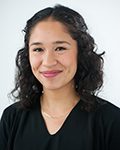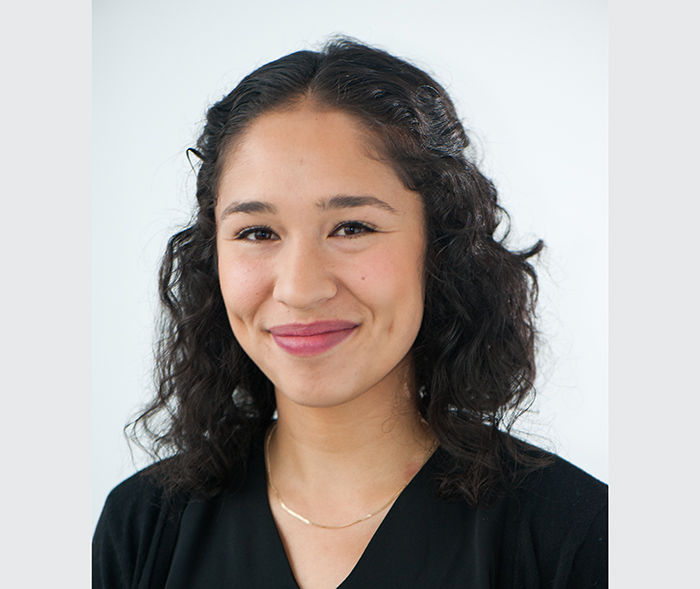We’re taking time over the following weeks to get to know the members of the GSA’s Early Career Scientist Committees. Join us every week to learn more about our early career scientist advocates.

Filomene Morrison
Diversity Subcommittee
Boston University School of Medicine and VA Boston Healthcare System
Research interest
Post-traumatic stress disorder (PTSD) is a severely debilitating psychiatric disorder that affects approximately 7.8% of the general population, with higher rates of PTSD (up to 23%) reported among combat veterans of the Iraq and Afghanistan conflicts. Strikingly, rates of PTSD reach up to 46% in individuals living in neighborhoods with high levels of violence and in inner-city neighborhoods. A large body of research performed over the course of the last couple of decades has shown that both PTSD and Major Depressive Disorder (MDD) are characterized by significant alterations in the inflammatory system; that is, individuals with these psychiatric disorders have an increased baseline level of circulating pro-inflammatory players in their blood as compared to healthy individuals.
My research aims to further understand these changes in the inflammatory profile of the periphery (blood) and the brain in individuals with PTSD and depression. To do this, I use data and biological samples from large cohorts that collect biological samples from individuals across time. I also analyze brain tissue samples from the VA National PTSD Brain Bank, which allows us the unprecedented ability to look for markers of inflammation in the brain of individuals who had PTSD and/or depression during their lifetimes.
I am really interested in how genetics interact with environmental factors (such as exposure to trauma) to influence the development of PTSD, depression, and, potentially, this heightened inflammatory state. Our lab uses sequencing techniques to look at changes in DNA, RNA, and methylation. By using multiple approaches to study psychiatric disorders and the onset/progression of PTSD and MDD across a lifetime, our field aims to identify potential interventions and/or targets for therapeutics with the goal of improving the lives of individuals living with these disorders.
What career paths interest you the most?
I am interested in a career where I positively impact the health and well-being of our communities through scientific progress—and where I can work as part of a team to creatively approach tough questions. For these reasons, I am most interested in pursuing a career as an independent investigator in academia with a research focus on better understanding psychiatric disorders. My PhD research on fear and anxiety-related disorders in mouse models and my current work studying PTSD in humans have highlighted the importance of translational research. Translational research tackles a problem in human populations by dissecting its mechanism through basic bench biology and animal models before translating these findings back to the clinic; I believe this cross-talk between disciplines holds the greatest promise for developing treatments for psychiatric disorders.
I hope to pursue a translational research career that bridges the gap between basic research in animal models and human clinical and postmortem research to study trauma, PTSD, and other fear and anxiety related disorders. I am also really interested in the public health implications of these disorders; I want to better understand the genetic and environmental factors that make some individuals more susceptible to developing psychiatric disorders than others, and I want to find ways that research in this area can be used to advocate for improved health of affected communities. Finally, I’m excited to serve as a mentor in academic research settings and to continue science educational outreach efforts in K-12 settings as a way to make scientific research more relevant and approachable to the next generation.
How else do you want to advance the scientific enterprise?
In my work as a mentor scientist and teacher with the Boston Science Club for Girls (SCFG), I helped lead after-school programming in science topics for elementary and middle school-aged girls. The goal SCFG programming is for all lesson plans to be interactive, dynamic, educational and fun; as a mentor scientist, I helped the girls in the club design, execute, and discuss the results of experiments; work as a team on their projects and experiments; and gain confidence in thinking, discussing, and getting excited about science. We also designed lesson plans where our students learned about prominent female scientists, and they had the chance to ask their mentor scientists about their career paths, challenges, and day-to-day lives as scientists.
Often, young students have visions of a scientist as a lone white-lab-coat-frocked person (usually a man) in a basement—it was really important for us to share that science is for everyone and to give them examples of scientists from all kinds of backgrounds. I plan to continue mentoring and doing outreach in K-12 settings and hope to continue improving as an educator while instilling creativity and excitement about science in the next generation. Through these efforts, my goal is to improve access to science education and research for women and underserved communities. I have benefitted from incredible mentorship throughout my career, and I look forward to giving back to my community by mentoring others.
As a leader in the GSA, what do you hope to accomplish?
I believe that increasing community engagement and understanding of science goes hand in hand with increasing diversity in scientific research. As a member of the Diversity Subcommittee, I am looking forward to helping establish a mentoring program to support GSA members in forging connections within the GSA community. Progress in science is dependent on the exchange of ideas that comes from active discussion between individuals with diverse backgrounds and upbringings. I hope to contribute to the creation of supportive and inclusive spaces within the GSA to help support graduate students, postdocs, and early career investigators in their research and career development. I also plan to continue my work in scientific outreach and public engagement by working with other subcommittees within GSA to learn how to best enhance community participation and engagement with science.
Previous Leadership Experience
- Volunteer—Association for Women in Science (AWIS), Massachusetts Chapter
- Washington Fellow—American Society for Pharmacology and Experimental Therapeutics (ASPET)
- Coordinator—McLean Hospital Neuroscience Education Outreach Program
- Mentor—Boston Science Club for Girls (SCFG)
- Vice President—Emory Women in Neuroscience (EWIN)













